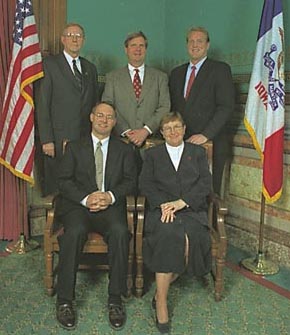|
| ||||||
|
IOWA OFFICIAL REGISTER | ||||||
|
photo by Russ Bickett | ||||||
|
| ||||||
|
IOWA EXECUTIVE COUNCIL
Seated: Michael Fitzgerald, Treasurer; Patty Judge, Secretary of Agriculture Standing: Dick Johnson, Auditor; Tom Vilsack, Governor; Chet Culver, Secretary of State | ||||||
|
THE EXECUTIVE COUNCIL
TOM VILSACK, governor CHESTER J. CULVER, secretary of state RICHARD D. JOHNSON, auditor of state MICHAEL L. FITZGERALD, treasurer of state PATTY JUDGE, secretary of agriculture Georganna Madsen, administrative support
The Executive Council was created by the adoption of the Code of 1860. The secretary of state acted as secretary of the council until the enactment of the Code of 1897, which provided for a secretary. Among the duties placed upon the Executive Council by the laws of Iowa are the following: to act upon all state activities and to notify all interested persons of action taken therein; to determine the value at which property may be taken by Iowa corporations and amount of stock which may be issued on account thereof; to approve articles of incorporation and by-laws of building and loan associations and plan for liquidation of said associations; to approve property purchases; to authorize department leases; to authorize and pay special assessments; to authorize and pay court costs and special attorney general fees; to authorize condemnation proceedings; to approve bank depositories of public funds; to authorize the canvass of votes cast for state and district officers; and to approve out-of-state travel.
Report of Executive Council SecretarySection 19.6 Code of Iowa, 1985, requires that a report of the secretary of the Executive Council be published in the Iowa Official Register. The portion of the report of the secretary dealing with matters of general interest is presented here. Other matters required in the report as to Iowa cities and the official canvass of Iowa election results are presented in tables elsewhere. The council had 42 regular meetings and convened one time as the Official Board of Canvass in 1997. There were no corporations authorized to issue stock in exchange for property or out of surplus in 1997. The council had 42 regular meetings and convened two times as the Official Board of Canvass in 1998. There were no corporations authorized to issue stock in exchange for property or out of surplus in 1998.
GovernorThe supreme executive power of the state is vested in the governor. It is the governor's duty to see that the laws are enforced, to supervise the official business of the state, to make recommendations to the General Assembly, and to appoint various officers and board members. Most major appointments are subject to confirmation by the Senate. The governor has the power to call special sessions of the legislature and veto acts passed by the General Assembly, but a majority of two-thirds of each house may pass a bill over the veto. To qualify as governor, a person must have been a citizen of the United States and a resident of the state for at least two years, and must be 30 years of age or older at the date of election. | ||
